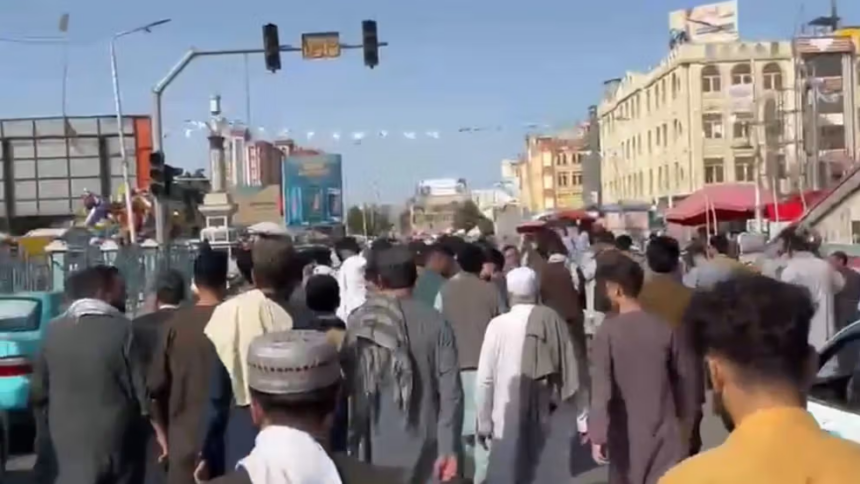RASC News Agency: In a rare act of public defiance, hundreds of residents of Mazar-i-Sharif, the capital of Balkh province, poured into the streets on Tuesday, September 16, after Taliban authorities demolished dozens of shops in the city’s historic Lilami marketplace. The demonstrators, carrying placards and chanting slogans such as “Death to traitors” and “Give us back our shops”, condemned what they described as the regime’s ruthless seizure of property and destruction of livelihoods.
According to protesters, Taliban municipal forces stormed into the area without prior notice and razed several shops to the ground. For many families, these shops represented their only source of income. Shopkeepers stressed that they had dutifully paid taxes and rent, but the Taliban are attempting to confiscate the area by brute force an act they denounced as “open tyranny” and blatant abuse of authority.
Eyewitnesses reported that in recent days, Taliban officials not only destroyed multiple shops but also issued threats that remaining properties in the district would soon face the same fate. The demolitions have ignited outrage in Mazar-i-Sharif and drawn attention to a pattern of systemic land grabs across Afghanistan since the Taliban’s return to power.
Civil society activists and legal experts assert that these acts are not isolated incidents but part of a calculated strategy of dispossession. Over the past four years, hundreds of Afghanistani families have been forcibly evicted from their homes, their farmlands seized, and their properties handed over to Taliban loyalists and affiliates. Such measures, critics argue, reveal the regime’s intention to re-engineer urban and rural economies under its control, while reducing ordinary citizens to dependence and poverty.
“This is not about urban planning or legality it is about power, greed, and intimidation,” said one activist in Kabul, who requested anonymity for fear of reprisals. “The Taliban are stripping people of their homes and businesses to reward their networks, while leaving families destitute.”
At the conclusion of the demonstration in Mazar-i-Sharif, residents called on the international community and human rights organizations to intervene urgently. They demanded that pressure be exerted on the Taliban to halt the illegal demolitions, return seized properties, and respect the basic rights of citizens. Protesters warned that if unchecked, such actions will not only deepen poverty but also fuel resentment and resistance against Taliban rule.
Analysts say the events in Mazar-i-Sharif epitomize the Taliban’s governance style: authoritarian, extractive, and indifferent to the suffering of the Afghanistani people. While the regime cloaks its actions in the language of “order” and “morality,” the reality, critics argue, is one of systematic dispossession and repression.
The courageous protest in Mazar-i-Sharif underscores an important truth: despite the Taliban’s attempts to silence dissent through fear and coercion, ordinary Afghanistanis continue to resist the erosion of their rights, their dignity, and their livelihoods.






